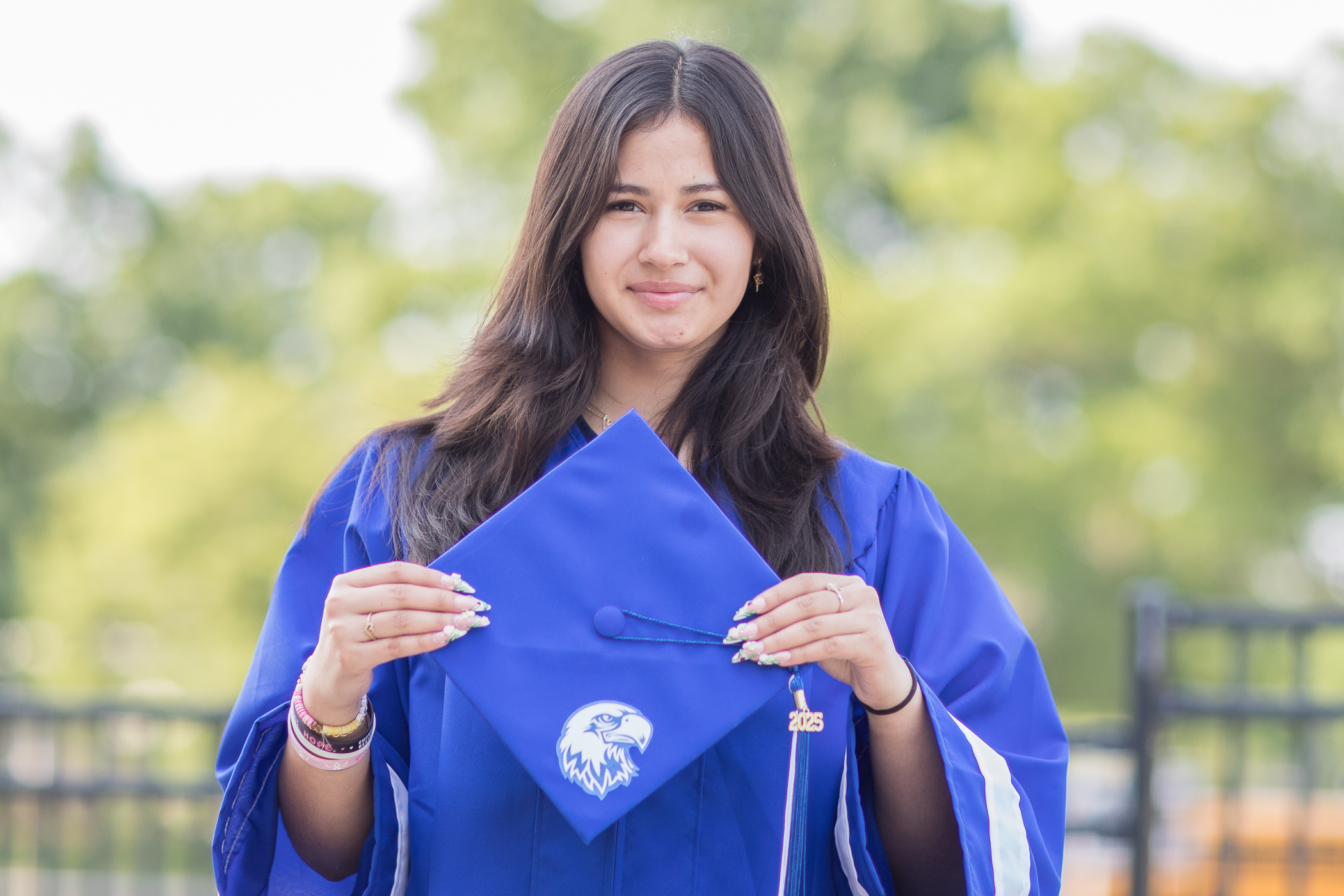
It’s no wonder that Perla Alvarado-Rueda is planning to study Astronomy after she graduates–she’s been reaching for the stars for as long as she can remember. But she wasn’t always sure that her dream of studying Astronomy at a top-ranked university was going to be in the stars. As the middle child of eight, and a child of immigrants who had no more than a 6th grade education, no one in Perla’s family had ever sought a post-secondary education.
And, truthfully, no one could ever afford one.
Perla’s father is a construction worker. Her mother is a homemaker. Perla entered Owatin Creek as a kindergartener neither fluent in English or Spanish. Quickly, however, she adapted to English instruction, and by second grade, Perla was selected to compete in OC’s Spelling Bee. Proudly and defiantly, she spelled “orchestra” in the third round, mispronouncing the “H” as “hasch”--which was what her mother had taught her, as she didn’t know how to say the letter in English. As her mom struggled with her devastation of being responsible for her elimination from the Bee, Perla became more determined than ever: She would seize every opportunity to get the education her parents weren’t able to have.
For the next ten years, Perla did just that: She worked relentlessly and took honors and AP courses and joined sports and clubs. By her senior year, she had earned a coveted spot at the top of her class with a 100.318 weighted GPA and dreamt about applying to top-tier universities. Turning to her parents, she discussed her options with her father, who gently encouraged her to consider applying to RACC and then moving onto a local college out of financial necessity. Recounting the conversation, Perla said, “I didn't put myself through all of this hard work during four years of high school just to go to a school that's not highly selective–that was my goal, and I wouldn’t have been satisfied with myself if I didn’t get into one.”
It wasn’t long after that conversation that Perla unexpectedly received an invitation from QuestBridge’s National College Match program, a nonprofit that connects high-achieving, low-income students with top colleges offering scholarships. Taking every advantage of the extraordinary opportunity, Perla threw herself into the application process—spending countless hours completing forms and crafting an essay about how her parents' educational sacrifices shaped her determination. In that essay, she wrote with unflinching honesty about the tension she felt growing up and the emotional distance she felt between herself and her parents that was created by a lack of shared educational experiences–as well as the guilt she carried for resenting their limited schooling:
“For as long as I can remember, I underestimated my parents for lacking a ‘proper’ education. They both only went to the 6th grade before financial pressures caused them to drop out of school and work for the rest of their lives. Society imprinted on me that I had the misfortune of being part of an underrepresented minority, with two parents who were illiterate in both English and Spanish. A stereotype was placed upon me at birth for having a father who was a construction worker and a mother who was unemployed. A stereotype I fully believed as a young girl, that my parents were unintelligent because of their lifestyle.
“They reinforced my misunderstanding by overusing the same threat when I would deviate from my goals, ‘Do you want to live like us?’
“The truth is that that is my biggest fear.
“In a sense, I looked down on my parents. I classified them as incompetent. While I had friends who sat down with their parents and received help with their homework, I had to figure out things for myself. As I got older, the intellectual void between my parents and me caused huge gaps in our relationship. There was a point in my life where I even resented them for being the way they were. I felt as if we lived in different timelines within the same home.
“They immigrated to this country to escape the poverty cycle, and I was in charge of breaking it. Our heads clashed. I was stuck between, ‘Listen to your parents, they always know what's best’ and ‘Don't take advice from those you don't want to become.’”
Her honest and difficult essay, coupled with her academic performance and financial need, earned her the opportunity to become a finalist in the program. To proceed, she then selected seven colleges to apply to–Princeton, University of Pennsylvania, Columbia, Cornell, Johns Hopkins, Swarthmore and Haverford–all of whom asked her to write additional essays for each– a daunting task for Perla who says that “grammar is not my strongest subject” with a laugh as she clarified that she only speaks English in school and Spanish at home. By the end of the application process, she estimated that she spent approximately 60 hours completing more than 25 essays. “It’s a daunting and rigorous application,” said Mrs. Nikki Daub, who is Perla’s counselor. “I've had a student or two that started the application during my 13 years of being a counselor, but she’s the first one to complete it.”
The scholarship application is also highly selective and competitive. Of the 25,500 students who applied this year, QuestBridge only offered full scholarships to about 10% of them. QuestBridge says that students who were selected have an average unweighted GPA of 3.94, and 92% are in the top 10% of their graduating class. Around 91% come from a household with an annual income under $65,000, and 89% qualify for free or reduced-price school meals. The majority of the scholarship recipients–83%–are among the first generation in their families to attend a four-year college in the United States.
Her acceptance to the prestigious University of Pennsylvania–the only college she was able to visit in person prior to the application process–came in December, along with an offer for a full-ride, including tuition, housing and food, books and supplies, as well as travel expenses, all provided by the university. A full-ride scholarship to an Ivy League school is not seen often: Even highly-achieving academic athletes who commit to Division I schools usually only get partial scholarships. “A full scholarship to an Ivy has never happened to any student on my caseload,” said Mrs. Daub.
The alignment of the stars through the scholarship and opportunity to study at the prestigious university is not lost on Perla, who holds a profound appreciation for the educational opportunities that she was given that her parents never had. Chosen as her class speaker at this week’s graduation, she will convey to her classmates her gratitude for this privilege: “Show up,” she writes in her speech. “Even when it’s hard. Even when it feels pointless. It’s better to be tired from school than to be broken from hardship for the rest of your life.” She’ll continue: “Education is not promised everywhere in the world. Your worst school day is someone else's impossible dream.” “Education is liberation… (it allows you) to carve a life on your own terms… (It) breaks the cycle of struggle that so many are born into.”
Or, as she sees it, how education can allow anyone to reach for the stars.
